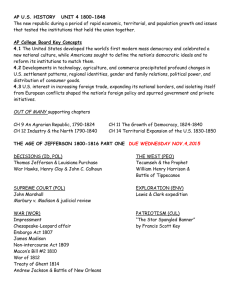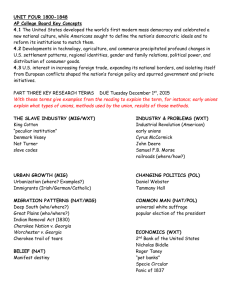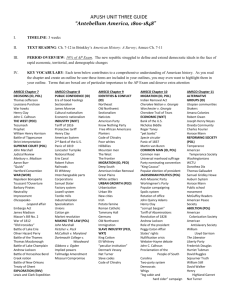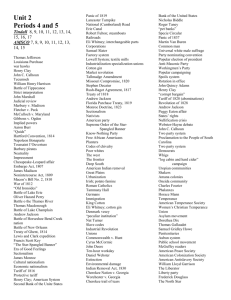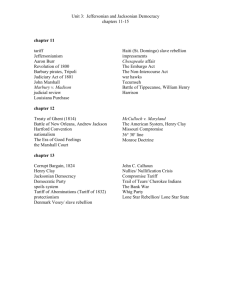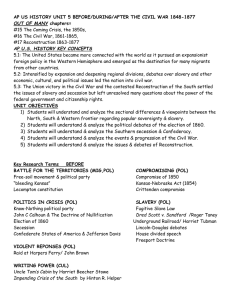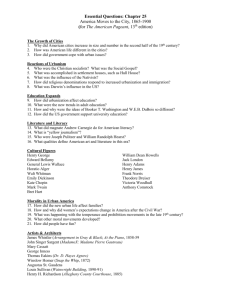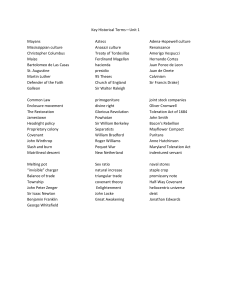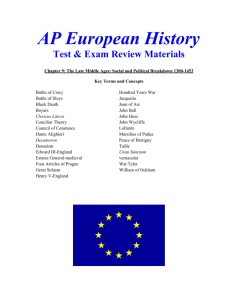Period 4 terms - Mr Roberts APUSH
advertisement
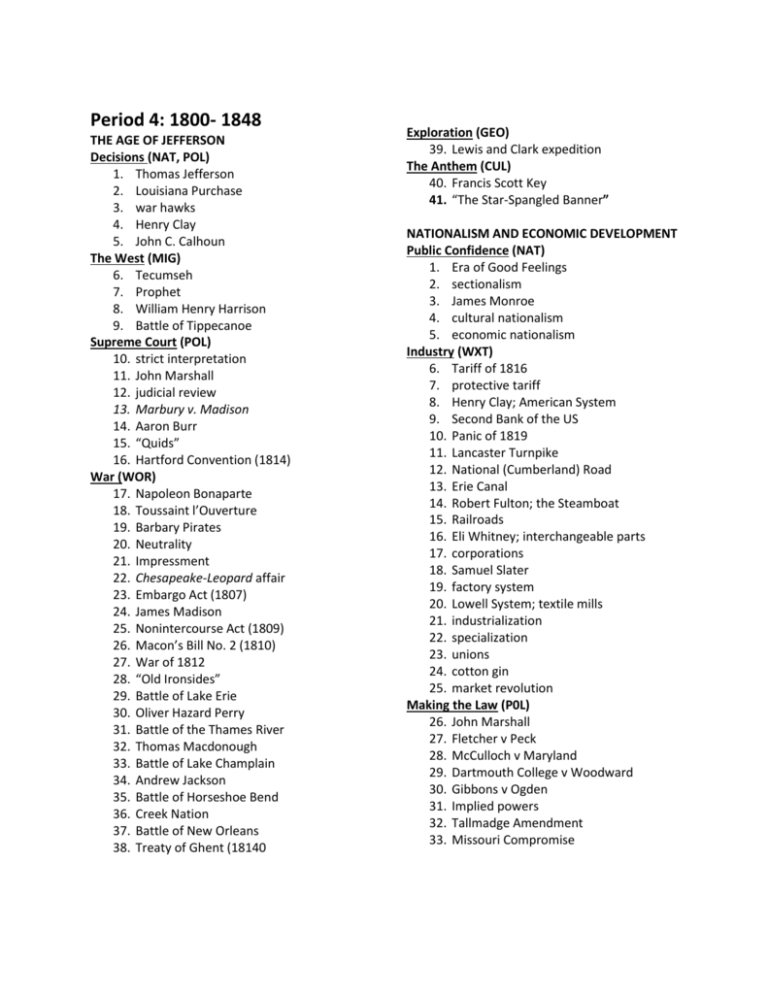
Period 4: 1800- 1848 THE AGE OF JEFFERSON Decisions (NAT, POL) 1. Thomas Jefferson 2. Louisiana Purchase 3. war hawks 4. Henry Clay 5. John C. Calhoun The West (MIG) 6. Tecumseh 7. Prophet 8. William Henry Harrison 9. Battle of Tippecanoe Supreme Court (POL) 10. strict interpretation 11. John Marshall 12. judicial review 13. Marbury v. Madison 14. Aaron Burr 15. “Quids” 16. Hartford Convention (1814) War (WOR) 17. Napoleon Bonaparte 18. Toussaint l’Ouverture 19. Barbary Pirates 20. Neutrality 21. Impressment 22. Chesapeake-Leopard affair 23. Embargo Act (1807) 24. James Madison 25. Nonintercourse Act (1809) 26. Macon’s Bill No. 2 (1810) 27. War of 1812 28. “Old Ironsides” 29. Battle of Lake Erie 30. Oliver Hazard Perry 31. Battle of the Thames River 32. Thomas Macdonough 33. Battle of Lake Champlain 34. Andrew Jackson 35. Battle of Horseshoe Bend 36. Creek Nation 37. Battle of New Orleans 38. Treaty of Ghent (18140 Exploration (GEO) 39. Lewis and Clark expedition The Anthem (CUL) 40. Francis Scott Key 41. “The Star-Spangled Banner” NATIONALISM AND ECONOMIC DEVELOPMENT Public Confidence (NAT) 1. Era of Good Feelings 2. sectionalism 3. James Monroe 4. cultural nationalism 5. economic nationalism Industry (WXT) 6. Tariff of 1816 7. protective tariff 8. Henry Clay; American System 9. Second Bank of the US 10. Panic of 1819 11. Lancaster Turnpike 12. National (Cumberland) Road 13. Erie Canal 14. Robert Fulton; the Steamboat 15. Railroads 16. Eli Whitney; interchangeable parts 17. corporations 18. Samuel Slater 19. factory system 20. Lowell System; textile mills 21. industrialization 22. specialization 23. unions 24. cotton gin 25. market revolution Making the Law (P0L) 26. John Marshall 27. Fletcher v Peck 28. McCulloch v Maryland 29. Dartmouth College v Woodward 30. Gibbons v Ogden 31. Implied powers 32. Tallmadge Amendment 33. Missouri Compromise Foreign Affairs (WOR) 34. Stephen Decatur 35. Rush-Bagot Agreement (1817) 36. Treaty of 1818 37. Andrew Jackson 38. Florida Purchase Treaty (1819) 39. Monroe Doctrine (1823) SECTIONALISM, 1820- 1860 Migration (NAT, MIG) 1. Indian Removal Act (1830) 2. Cherokee Nation v Georgia 3. Worchester v Georgia 4. Cherokee Trail of Tears Economics (WXT) 5. Bank of the US 6. Nicholas Biddle 7. Roger Taney 8. “pet banks” 9. Specie Circular 10. Panic of 1837 11. Martin Van Buren Common Man (NAT, POL) 12. common man 13. universal white male suffrage 14. party nominating convention 15. “King Caucus” 16. popular election of president Jacksonian Politics (POL) 17. Anti-Masonic party 18. Workingmen’s party 19. popular campaigning 20. spoils system 21. rotation in office 22. John Quincy Adams 23. Henry Clay 24. “corrupt bargain” 25. Tariff of 1828; “tariff of abominations” 26. Revolution of 1828 27. Andrew Jackson 28. role of the president 29. Peggy Eaton affair 30. state’s rights 31. nullification crisis 32. Webster-Hayne debate 33. John C Calhoun 34. Proclamation to the People of South Carolina 35. 36. 37. 38. Two-party system Democrats Whigs “log cabin and hard cider” campaign REFORM, 1820- 1860 Alternative Groups (NAT) 1. utopian communities 2. Shakers 3. Amana Colonies 4. Robert Owen 5. New Harmony 6. Joseph Henry Noyes 7. Oneida community 8. Charles Fourier 9. phalanxes 10. Horace Mann Reforming Society (POL) 11. Temperance 12. American Temperance Society 13. Washingtonians 14. Women’s Christian Temperance Union 15. asylum movement 16. Dorothea Dix 17. Thomas Gallaudet 18. Samuel Gridley Howe 19. penitentiaries 20. Auburn system 21. Horace Mann 22. public school movement 23. McGuffey readers 24. American Peace Society Abolition Effect (POL) 25. American Colonization Society 26. American Antislavery Society 27. Abolitionism & William Lloyd Garrison; The Liberator 28. Liberty party 29. Frederick Douglas; The North Star 30. Harriet Tubman 31. David Ruggles 32. Sojourner Truth 33. William Still 34. David Walker 35. Henry Highland Garnet 36. Nat Turner New Ideas (CUL) 37. antebellum period 38. romantic period 39. transcendentalists 40. Ralph Waldo Emerson, “ The American Scholar” 41. Henry David Thoreau, Walden, “ On Civil Disobedience” 42. Brook Farm 43. George Ripley 44. feminists 45. Margaret Fuller 46. Theodore Parker 47. George Caleb Bingham 48. William S. Mount 49. Thomas Cole 50. Frederick Church 51. Hudson River school 52. Washington Irving 53. James Fenimore Cooper 54. Nathaniel Hawthorne 55. Sylvester Graham 56. Amelia Bloomer Thoughts on Religion (CUL) 57. Second Great Awakening 58. Timothy Dwight 59. revivalism; revival (camp) 60. meetings 61. millennialism 62. Church of the Latter-Day Saints; Mormons 63. Joseph Smith 64. Brigham Young 65. New Zion Women’s Rights (CUL) 66. women’s rights movement 67. cult of domesticity 68. Sarah Grimke 69. Angelina Grimke 70. Letter of the Condition of Women and Equality of the Sexes 71. Lucretia Mott 72. Elizabeth Cady Stanton 73. Seneca Falls Convention (1848) 74. Susan B. Anthony
